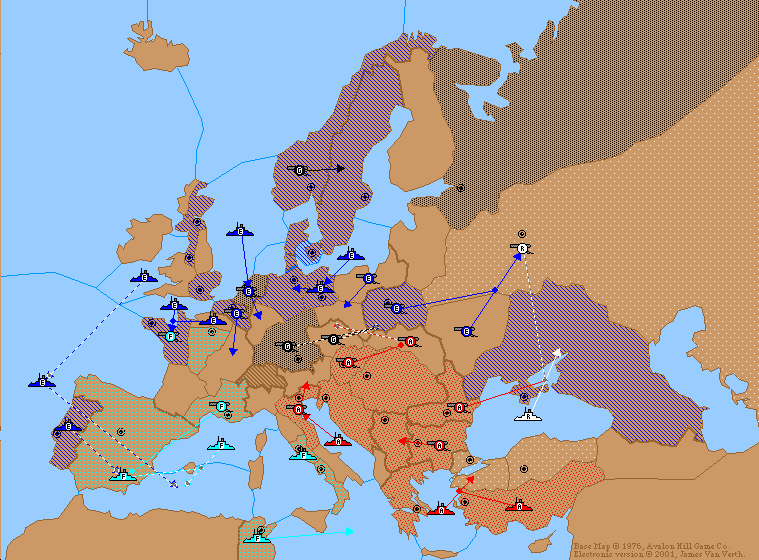The following is excerpted from the James Grout’s online Encyclopædia Romana
(http://penelope.uchicago.edu/~grout/encyclopaedia_romana/calendar/romancalendar.html)
The text has to do with “Years of Confusion” and Julius Caesar’s role in ending them. It seemed thematically appropriate to non-events in Silesia this season. (The asterisks are mine)…
“According to Livy, it was Numa Pompilius, the second king of Rome (715-673 BC), who divided the year into twelve lunar months… This was a lunar year of 354 days but, because of the Roman superstition about even numbers, an additional day was added to January to make the calendar 355 days long…
Twelve lunar months are shorter by about eleven days than the solar year (365 - 354). Without intercalating (inserting) these missing days, the calendar cannot keep a synchronicity with the seasons, as Suetonius observed, "Harvest festivals did not come in summer nor those of the vintage in the autumn”. Such was the disparity between the calendar of the Roman Republic and the solar year that, when a nearly total eclipse of the sun was observed in Rome on March 14 (190 BC), it was recorded as having taken place on July 11…
Nor did the college of pontiffs (from pontifex or "bridge maker"), who were responsible for regulating the calendar and the festivals that depended upon it, always intercalate the additional days necessary to synchronize the lunar and solar years. Intercalation was considered unlucky and, during the Second Punic War (218-201 BC), when Rome struggled against Carthage, the priests were hesitant to make any changes at all. Often, too, the calendar was manipulated more for partisan political consideration and vested interest than to adjust for the seasons. The tenure of an office holder could be extended or reduced, and legislation given more or less time before a vote. Bibulus, Caesar's co-consul in 59 BC, for example, attempted to thwart the legislation of his more powerful colleague by declaring all the remaining days of the year to be holidays so the assembly could not legally meet…
The pontifex maximus had to be in Rome during February to declare whether there would be an intercalation that year. But Julius Caesar, who had been elected chief priest in 63 BC, was preoccupied in Gaul and then with civil war, and there had been only one intercalation since he became proconsul…. When Caesar finally returned to Rome from the Egyptian campaign in 46 BC and was declared dictator, a *three-month discrepancy* existed between the seasons and their calendar date…
That year, a reformed calendar, based on the solar year, was introduced by Caesar… the missing ninety days were intercalated, extending the ultimus annus confusionis, "the last year of confusion," as Macrobius calls it, to *445 days* and causing March 1 in the Republican calendar to fall on January 1, 45 BC in the new Julian calendar…”
Ah, yes, years of confusion. Not to mention uncommonly long adjudications. To be fair, Julius Caesar isn’t the best metaphor I could think of, but it’s topical, and that’s what matters. The better metaphor is an old Peanuts strip I remember (sorry, I can’t locate it on the interweb). It’s a baseball game, and a fly ball is hit. A couple of kids yell, “I’ve got it!” and then pandemonium ensues… “You’ve got?” “He’s got it?” “Who’s got it?” “We’ve got it!!” THUD. The ball falls to the ground uncaught.
Two Germans and an Austrian offer support into Silesia… and a lone unsupported English army enters unopposed.
There is no peace.
There are two retreats due tomorrow.
French army Brest may retreat to Gascony, Paris, or OTB.
Russian army Moscow may retreat to Livonia, Saint Petersburg, or OTB.
The Winter will depend upon the retreats, especially whether Russia retreats to German-owned St. Pete’s. But as a foretaste, here’s the SC and unit counts:
Austria: Supp 10 , Unit 8 , Build 2
England: Supp 13 , Unit 13 , Build 0
France: Supp 6 , Unit 6 , Build 0
Germany: Supp 2 or 3 , Unit 3 Remove 1 or 0
Russia: Supp 2 or 3, Unit 2 , Build 0 or 1 (unusable)
In short, Austria builds two. Germany may have to disband one.
Fall 1912 Adjudication
Austria:
a ven-tyr
f adr-ven
f aeg-con
f smy s f aeg-con
a bul-ser
a rum s f bla-sev
a gal s a boh-sil (*Void*)
a vie s a gal
England:
F Bal - Ber
A Bel - Bur
F Ber - Kie
F Eng - Bre
A Hol - Ruh
F IRI - MAO (*Fails*)
F MAO - Wes (*Bounce*)
F NTH - Hol
F Pic S Eng - Bre
F Por - Spa(sc) (*Fails*)
A Pru - Sil
A Ukr - Mos
A War S Ukr – Mos
France:
Fleet Spain (sc) Support Fleet GoL Move To Western Med (*Cut*)
Army Marseilles Support Fleet Spain (sc)
Arm Brest HOLD (*Dislodged*)
Fleet Rome HOLD
Fleet Tunis Move To Ionian Sea
Fleet GoL Move To Western Med (*Bounce*)
Germany:
A Norway - Sweden
A Mun S Austrian A Gal-Sil (*Void*)
A Boh S Austrian A Gal-Sil (*Void*)
Russia:
Mos supports Bla to Sev (*Dislodged*)
Bla to Sev |



